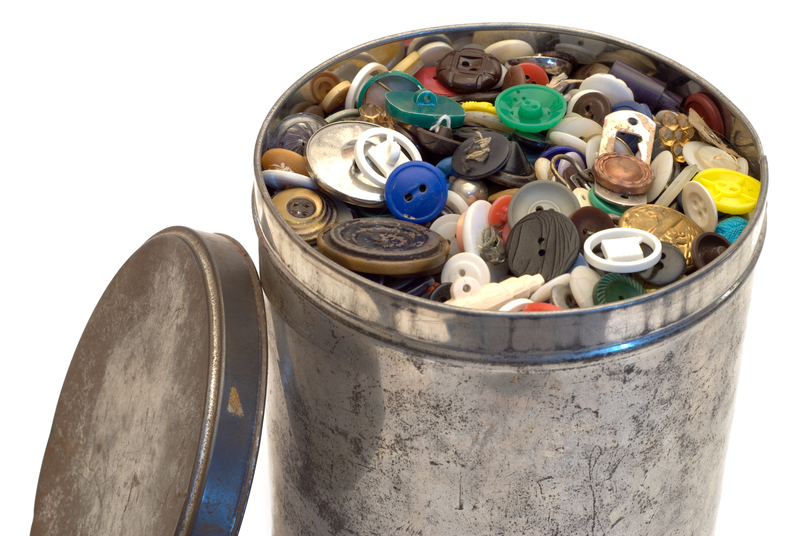The Savvy Homeowner's Guide to Bulky Waste Savings
Are you overwhelmed by the cost and hassle of bulky waste disposal? You're not alone! Every year, homeowners grapple with large items such as old furniture, appliances, mattresses, and yard debris that can't simply be left out for regular trash pickup. This comprehensive guide explores how you--as a savvy homeowner--can save money, stay eco-friendly, and simplify the process of bulky waste removal. Read on to discover pro tips, local options, and innovative solutions to bulky waste savings.
Understanding Bulky Waste: What Qualifies?
Before you can save money on bulky waste removal, it's essential to understand what actually counts as bulky waste. The term refers to large items that municipal garbage collection services often exclude from standard pickups. These include, but are not limited to:
- Furniture: Couches, sofas, recliners, beds, dressers, tables, and chairs
- Appliances: Refrigerators, washing machines, dryers, stoves, microwaves, air conditioning units
- Mattresses: Box springs and bed frames
- Yard Waste: Tree branches, large shrubbery, non-bagged leaves, and logs
- Electronics: TVs, computers, speakers, and printers
- Other Large Items: Carpets, bathtubs, toilets, and water heaters
Some items (like electronics or appliances containing hazardous materials) may even require special handling or fees for proper disposal. Knowing exactly what constitutes bulky waste in your area is your first step toward maximizing your savings.

Why Bulky Waste Disposal Can Be Expensive
Bulky waste collection requires extra resources--larger vehicles, additional staff, and special handling for recycling or hazardous components. This additional resource requirement is why many municipal services apply extra charges for large-item pickups, or don't offer them at all.
Commercial junk removal services are fast but often charge substantial fees. Understanding the factors behind these costs allows you to find creative ways to save on bulky item disposal.
Key Cost Factors Include:
- Item size and weight
- Number of items
- Type of material (recyclable, electronic, hazardous, etc.)
- Distance to landfill or processing facility
- Labor and hauling costs
- Municipal surcharges or dump fees
With this knowledge in hand, let's explore affordable strategies for bulky waste savings.
Top Strategies to Save Money on Bulky Waste Disposal
1. Use Municipal Bulky Waste Collection Days
Most cities and towns offer once or twice yearly bulky item collection days at little to no cost. Planning your disposal around these dates can save you significant money compared to booking private junk removal.
- Check your municipality's website or call your waste management office for schedules.
- Be prepared - rules on the types and quantities of items are common.
- Set reminders and prepare items well in advance.
Pro Tip: Pool resources with neighbors or HOA groups to organize community-wide cleanups during these windows for even greater cost-sharing.
2. Take Advantage of Recycling Centers and Drop-Off Locations
Many areas have designated facilities for accepting electronics, appliances, old mattresses, and other bulky refuse. Some of these centers provide free or reduced-cost drop-off, especially for residents.
- Search for local "household waste recycling centers" and ask about current policies and fees.
- Be mindful--appointment slots may be limited, so book ahead.
- Be prepared to load and transport items yourself for maximum savings.
Many charities, such as Habitat for Humanity ReStores and Goodwill, even offer free pick-up services for certain items that are still in usable condition.
3. Reuse, Repurpose, or Donate Before You Dispose
Why pay to haul something away when you can give it a second life? Prioritize these options before considering the landfill:
- Donation: Local charities, shelters, theater groups, and schools may accept gently used furniture, appliances, and other large items.
- Freecycle / Curb Alerts: Post your items on local community boards, Facebook Marketplace, Craigslist, or neighborhood apps.
- Repurposing: Get creative--old doors become tables, or drawers transform into planters. Many online DIY communities provide inspiration for upcycling bulky waste.
Properly directing usable goods not only saves you disposal costs but also supports sustainability and your community.
4. Split Costs: Team Up with Neighbors
When a private junk hauling service or dumpster rental is necessary, coordinate with neighbors. Pooling together to fill a shared dumpster or arrange a group pickup divides fees and maximizes capacity, resulting in significant savings for all involved.
- Organize an annual "block cleanout weekend."
- Negotiate group discounts with local haulers or rental companies.
- Consider including yard debris, storm damage, or renovation scrap to increase value.
5. Understand Local Regulations and Avoid Fines
Improper disposal of bulky items can result in expensive fines and penalties. Laws vary by jurisdiction, so always:
- Check your city's "waste management" section for current bulky item rules.
- Confirm what requires special handling (refrigerants, electronics, paint, etc.).
- Ask if permits or pre-approvals are needed before leaving items at the curb.
Avoiding fines is a crucial part of savvy bulky waste management!
Eco-Friendly and Budget-Conscious Disposal Alternatives
Bulk Waste Recycling Programs
Many recyclable materials are eligible for free or low-cost pickup if separated correctly. Metals, electronics, wood, and some plastics may be diverted from the landfill and turned into new products. Ask your local solid waste authority about:
- Scrap metal yards (sometimes offer cash for steel, aluminum, or copper items!)
- Electronics take-back or e-waste events
- Special mattress recycling initiatives
By sorting these items and using approved recycling outlets, you can eliminate hauling fees and even earn a little money.
Bulky Items: DIY Removal vs. Professional Help
Should you handle the disposal yourself or hire help? Consider these pros and cons:
- DIY (Do-It-Yourself) Savings: If you have access to a truck or trailer, transporting your bulky waste directly to a landfill or recycling center saves on labor costs. However, you'll be responsible for any fees at the site and may need help lifting heavy objects.
- Hiring Professional Services: While more expensive, companies specializing in bulky waste management can quickly remove items and ensure proper, legal disposal. Some also perform basic sorting for recycling. This option is best when items are too large or hazardous for safe self-transportation.
Tip: Always request quotes from multiple providers and ask about price-matching or seasonal specials.
Bulky Waste Savings by Item Type
Disposing of Furniture
Furniture removal is one of the most common challenges. Save by:
- Offering usable pieces to thrift stores, shelters, or online free groups.
- Breaking down items for easier transport to waste or recycling centers.
- Contacting local upholstery shops--some reuse frames or fabric for their projects.
Getting Rid of Appliances
Old appliances often contain valuable metals and can be recycled or donated. Many appliance retailers offer haul-away deals when you purchase a replacement. Electric utility companies sometimes run rebates for swapping inefficient units.
- Find out if your local landfill or transfer station accepts appliances and what documentation or preparation is needed (e.g., removing doors for safety).
- Check for scrap yards that pay for metal appliances.
- Research local charity programs for working refrigerators, washers, or stoves.
Electronic Waste Solutions
Discarded TVs, computers, and stereos must be diverted from landfill due to toxic components. The best bulky E-waste disposal strategies include:
- Manufacturer and retailer take-back programs (some are free, others have nominal fees).
- Community e-waste recycling events.
- Certified electronics recyclers for bulk or commercial volumes.
*Never leave electronics at the curb--improper disposal can result in both environmental harm and hefty penalties.
Mattress and Box Spring Removal
Mattresses take up landfill space and can harbor pests if mishandled. Options include:
- Mattress stores with haul-away perks upon replacement.
- Dedicated recycling facilities (often charge a small fee).
- Donation to charities that accept gently used bedding.
Innovative Bulky Waste Savings Tips
- Sell before you toss: Host a yard sale or online auction for valuable yet unwanted bulky items. It's a win-win for your wallet and landfill diversion.
- Wait for "Free Dump Days": Many cities grant free or reduced dump days after major storms, holidays, or on scheduled community clean-up dates.
- Rent smart: Compare the cost of temporary roll-off dumpsters versus bag-style solutions such as Bagster for small-scale remodeling or cleanouts. These are often cheaper and more flexible.
- Bundle services: If you're renovating or landscaping, ask contractors to include debris removal in their bids.
- Document donations: Keep itemized records and donation receipts for potential tax write-offs on large charitable gifts.

Making Your Bulky Waste Removal Stress-Free and Cost-Efficient
Through diligent planning and resourceful strategies, any homeowner can reduce the stress and cost of managing bulky waste. Remember these keys to bulky waste savings:
- Know what's considered bulky waste by your local authorities.
- Research all available opportunities--from city programs to private recycling and donation outlets.
- Consider eco-friendly alternatives and community partnerships for maximum savings.
- Always factor in convenience, legality, and safety before choosing a disposal solution.
Frequently Asked Questions (FAQs) on Bulky Waste Savings
- How often can I dispose of bulky waste for free? This depends on your local municipal services. Many offer free pickup only once or twice per year, while others have ongoing drop-off options for residents.
- What if my city doesn't have bulky item pickup? Explore alternatives like donation pick-ups, recycling centers, and local haulers. Consider pooling with neighbors to reduce costs.
- Are certain items prohibited from bulky waste programs? Yes--electronics, hazardous materials, and construction debris often require separate disposal channels. Always verify beforehand.
- How can I avoid fines? Stay informed on local guidelines and never leave items curbside without proper authorization.
- Can I make money from bulky waste? Indeed--selling, scrapping, or recycling select items (furniture, appliances, metals) can actually put cash in your pocket.
Conclusion: Save Money, Save the Planet, and Simplify Your Life
The savvy homeowner's guide to bulky waste savings boils down to knowledge, timing, and resourcefulness. By understanding what's accepted, when to act, and where to look for eco-friendly solutions, you can dramatically cut costs while making a positive environmental impact. Next time bulky waste removal looms on your to-do list, return to these tips--and relish the savings, both financial and environmental.
Ready to tackle your next big disposal challenge? Put these savvy strategies into action, share them with your friends and neighbors, and watch your bulky waste disposal costs shrink!
